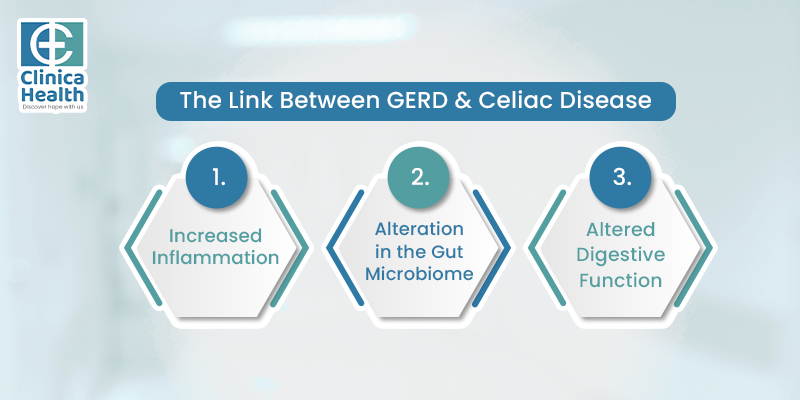-
 Call Now:
8010 552 552
7595 838 844
Call Now:
8010 552 552
7595 838 844
-
 Email Me:
[email protected]
Email Me:
[email protected]
Till now, GERD and celiac disease were considered to be two different conditions that primarily affect different areas of the digestive system. Though it is true, recent research suggests that there is a link between both these disorders.
The study revealed that people with celiac disease have significant GERD symptoms. Moreover, even patients with atypical GERD disease are also reported to have higher rates of GERD problems.
In this blog, we will delve deeper into the connection between GERD and celiac disease, exploring the implications of diagnosis and treatment options.
GERD is a chronic condition that is characterised by the backward flow of the stomach’s acidic content into the esophagus. Heartburn is a common symptom of GERD, accompanied by other signs like difficulty swallowing and chronic cough. GERD mostly happens when the muscles at the end of esophagus do not close properly and patients have no other option than GERD treatment surgery for a permanent solution.
Celiac disease is an autoimmune disorder where the small intestine gets damaged, which prevents the body from absorbing nutrients from food, resulting in malabsorption. The condition is mainly triggered by eating gluten, a protein found in wheat, barley and rye. Gastrointestinal issues such as diarrhoea, bloating and abdominal pain are the common symptoms. Some patients even experience non-gastrointestinal issues like fatigue, joint pain and skin rashes. The only effective treatment for celiac disease is by adhering to a strict gluten-free diet along with medications.
As per research and medical reports, there is a high prevalence of GERD symptoms in patients with celiac disease, making GERD treatment surgery a necessity. Several factors contribute to this risk.

There is no proven evidence as of now that indicates GERD is a risk factor for celiac disease due to shared symptoms. The conditions may coexist; however, the emphasis of the research is more on the relationship between celiac disease and GERD rather than the other way around.
Effective diagnosis and treatment are extremely essential for patients with GERD and celiac disease. Your doctor will perform tests to confirm whether it is GERD or celiac disease.
If it’s the latter, a strict gluten-free diet is recommended. If the symptoms do not improve, prescription and over-the-counter drugs will be given.
In cases where patients experience GERD symptoms, GERD treatment surgery is the only permanent solution along with avoiding triggered foods such as spicy, processed or fatty items.
If you are experiencing symptoms of either of the conditions, make sure to consult a reputed gastro surgeon who will conduct a thorough examination and identify if you are at an increased risk of GERD or celiac disease. Based on the results, a personalised treatment plan is prepared.